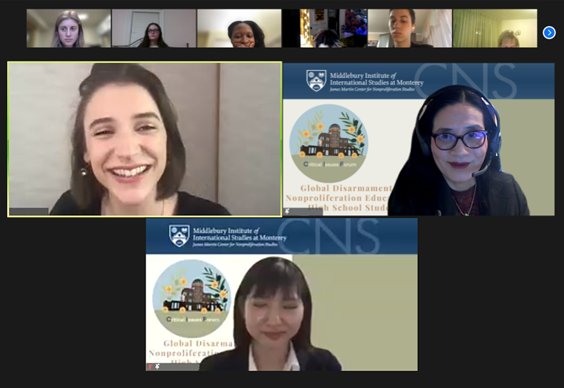October 8, 2021
Masako Toki
On October 8, 2021, The James Martin Center for Nonproliferation Studies (CNS) hosted the Critical Issues Forum’s (CIF) fourth Speaker Series, the first of the new academic year, featuring Mary Popeo from Hiroshima. The theme of this event was “Using Technology and Education to Bring the Past to the Present and the Future for Nuclear Disarmament.” The event included a keynote speech, panel discussion, breakout session, and interactive activities.
Keynote Speech
CNS Senior Project Manager Masako Toki presented an overview of the Critical Issues Forum and introduced Mary Popeo, the cofounder of Peace Culture Village (PCV) in Hiroshima. Popeo is originally from Boston and currently resides in Hiroshima, Japan, where she leads guided virtual tours of the Hiroshima Peace Memorial Museum and surrounding areas. At PCV, Popeo introduces visitors to the devastating humanitarian impacts of the atomic bombing and helps preserve the stories of Hibakusha (atomic bombing survivors).
Popeo began her keynote speech with a personal account of her first visits to the bombed cities, her first encounters with Hibakusha, and her motivation to get involved in peace and disarmament activities in Hiroshima. Popeo introduced Peace Culture Village, which she co-founded with former chairman of the Hiroshima Peace Culture Foundation Steven Leeper. Popeo described PCV’s mission to raise human consciousness to a peace culture, cultivate the next generation of peace leaders, and design jobs that create peace. Popeo discussed PCV’s peace and education activities for engaging youth.
Next, Popeo elaborated on how PCV uses immersive technology, including augmented reality, during Peace Park tours in Hiroshima. During the tour, tourists wear virtual reality headsets to see Hiroshima before, during and after the bombing. This virtual reality tour of the Hiroshima Peace Memorial Park, along with recorded testimonials from Hibakusha, is available to people who cannot visit Hiroshima in person. Popeo collaborated with international partners to create an app to bring life to the stories of Hibakusha and help facilitate a more intimate connection to past events. PCV hopes that this app will bring memories to the present and future, and help build a vital empathy for peace and disarmament activities. The app, Hiroshima Memorial Park, is available to download on your smartphone. There are both English and Japanese versions. Popeo stressed the importance of youth carrying on the legacy of Hibakusha with the help of technology, as the average hibakusha age is 84 years old.
Panel Discussion
After Popeo’s inspiring keynote speech, Shizuka Kuramitsu, a CIF alumna who participated in 2015 as a representative from Hiroshima Jogakuin Senior High School, joined the panel discussion. After her CIF participation in 2015, Kuramitsu remained involved in peace and disarmament activities. This fall, she started her Master’s Degree program in Nonproliferation and Terrorism Studies at the Middlebury Institute of International Studies at Monterey. Toki moderated the panel. Popeo and Kuramitsu discussed how to engage young people in nuclear disarmament movements and gave suggestions about what young people can do to make progress toward a world free of nuclear weapons. Both panelists suggested concrete ideas based on their experience in disarmament activities. Popeo emphasized the importance of making connections with like-minded people to further enhance disarmament initiatives.

Breakout Session
Next, participants were assigned to breakout rooms with 5-7 other students and teachers to share their thoughts and opinions candidly. During the breakout session, participants introduced themselves to one another while networking and shared their ideas on how each individual can be more actively involved in nuclear disarmament activities.
Concluding Session
Finally, after all participants came back to the “main room,” Popeo conducted a Word Cloud interactive activity where each participant shared one word describing how they felt after the event. Participants’ words included “hopeful” “inspired” and “motivated” after this engaging discussion.
During the question-and-answer session, participating students asked many thoughtful and engaging questions about the main challenges in peace activities as well as staying motivated through the challenges and setbacks. Questions also covered different perspectives toward nuclear disarmament and nonproliferation between Japan and the United States, as both speakers have experience in both countries.
This speaker series event highlighted the importance of youth engagement in nuclear disarmament and peace activities, especially using technology and education. The Critical Issues Forum continues to make efforts to reach out to a wider audience and more schools in order to bring diverse perspective groups to disarmament and nonproliferation discussions.
The Critical Issues Forum is supported by the Tom and Sarah Pattison Fund, the SAGA Foundation, Mr. Gregg Wolpert, and many private donors.